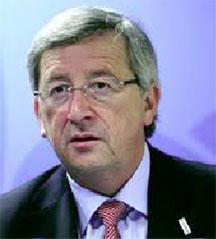BRUSSELS, (Reuters) – European Union leaders nominated Jean-Claude Juncker for their bloc’s most powerful job yesterday over the fierce objections of British Prime Minister David Cameron, who said the decision would make it harder for him to keep Britain in Europe.

Fellow leaders immediately sought to assuage Cameron – and an increasing eurosceptic British electorate – by promising to address London’s concerns about the EU’s future and to review the process for choosing future European Commission presidents.
Cameron forced an unprecedented vote at an EU summit to dramatise his opposition both to the way the former Luxembourg prime minister was chosen and to his suitability to head the EU’s executive that proposes and enforces EU laws.
He was outvoted 26-2 on a show of hands in a solemn moment that highlighted Britain’s isolation in the continental bloc of which it has been an uneasy, semi-detached member since 1973.
“The job has got harder of keeping Britain in a reformed EU,” Cameron said after his defeat. “The job has got harder, the stakes are higher, the battle to reform this organisation is going to be longer and tougher, no doubt about that.”
In a Europe crying out for reform, leaders had gone for a “career Brussels insider”, the career British politician said.
Juncker, 59, a veteran deal-broker at EU summits for more than two decades, will now go before the European Parliament for a confirmation vote on July 16, where he is likely to win a majority of centre-right and centre-left lawmakers.
EU leaders will hold another summit that day to decide on the other main EU jobs including a successor for European Council President Herman Van Rompuy, a new foreign policy chief and an economic policy czar.
